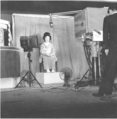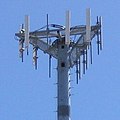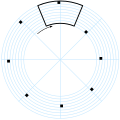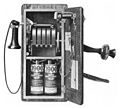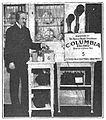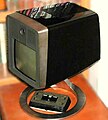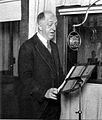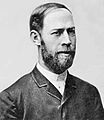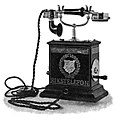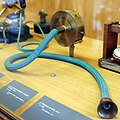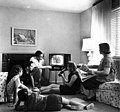Portal:Telecommunication
The Telecommunication Portal
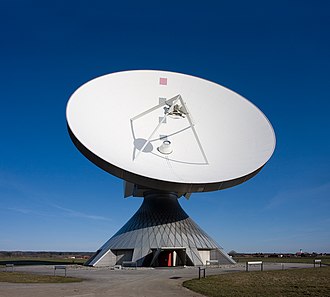
Telecommunication, often used in its plural form or abbreviated as telecom, is the transmission of information with an immediacy comparable to face-to-face communication. As such, slow communications technologies like postal mail and pneumatic tubes are excluded from the definition. Many transmission media have been used for telecommunications throughout history, from smoke signals, beacons, semaphore telegraphs, signal flags, and optical heliographs to wires and empty space made to carry electromagnetic signals. These paths of transmission may be divided into communication channels for multiplexing, allowing for a single medium to transmit several concurrent communication sessions. Several methods of long-distance communication before the modern era used sounds like coded drumbeats, the blowing of horns, and whistles. Long-distance technologies invented during the 20th and 21st centuries generally use electric power, and include the telegraph, telephone, television, and radio.
Early telecommunication networks used metal wires as the medium for transmitting signals. These networks were used for telegraphy and telephony for many decades. In the first decade of the 20th century, a revolution in wireless communication began with breakthroughs including those made in radio communications by Guglielmo Marconi, who won the 1909 Nobel Prize in Physics. Other early pioneers in electrical and electronic telecommunications include co-inventors of the telegraph Charles Wheatstone and Samuel Morse, numerous inventors and developers of the telephone including Antonio Meucci, Philipp Reis, Elisha Gray and Alexander Graham Bell, inventors of radio Edwin Armstrong and Lee de Forest, as well as inventors of television like Vladimir K. Zworykin, John Logie Baird and Philo Farnsworth.
Since the 1960s, the proliferation of digital technologies has meant that voice communications have gradually been supplemented by data. The physical limitations of metallic media prompted the development of optical fibre. The Internet, a technology independent of any given medium, has provided global access to services for individual users and further reduced location and time limitations on communications. (Full article...)
Selected article -

A telephone, colloquially referred to as a phone, is a telecommunications device that permits two or more users to conduct a conversation when they are too far apart to be easily heard directly. A telephone converts sound, typically and most efficiently the human voice, into electronic signals that are transmitted via cables and other communication channels to another telephone which reproduces the sound to the receiving user. The term is derived from Ancient Greek: τῆλε, romanized: tēle, lit. 'far' and φωνή (phōnē, voice), together meaning distant voice.
In 1876, Alexander Graham Bell was the first to be granted a United States patent for a device that produced clearly intelligible replication of the human voice at a second device. This instrument was further developed by many others, and became rapidly indispensable in business, government, and in households. (Full article...)
General images
Things to do
 |
Here are some tasks awaiting attention:
|
Selected biography -
Paul Julius Gottlieb Nipkow (22 August 1860 – 24 August 1940) was a German electrical engineer and inventor. He invented the Nipkow disk, which laid the foundation of television, since his disk was a fundamental component in the first televisions. Hundreds of stations experimented with television broadcasting using his disk in the 1920s and 1930s, until it was superseded by all-electronic systems in the 1940s.
Nipkow has been called the "father of television", together with other early figures of television history like Karl Ferdinand Braun. (Full article...)
Did you know (auto-generated) -

- ... that one of the original co-owners of New York state radio station WAQX-FM did much of the construction himself?
- ... that the World-Wide Navigational Warning Service divides the entire ocean into just 21 radio areas?
- ... that to prepare for her role in the television film Search for Grace, actress Lisa Hartman Black underwent hypnosis?
- ... that a boy's voice over CB radio claiming to be within an overturned truck in New Mexico sparked a search-and-rescue mission 49 years ago today?
- ... that Filipina actress Angel Aquino has been described as a "perennial villainess" for portraying several antagonistic roles on television?
- ... that Milton Grant went from disc jockey and bandstand host to an owner of television stations?
Related portals
Topics
Subcategories
Associated Wikimedia
The following Wikimedia Foundation sister projects provide more on this subject:
-
Commons
Free media repository -
Wikibooks
Free textbooks and manuals -
Wikidata
Free knowledge base -
Wikinews
Free-content news -
Wikiquote
Collection of quotations -
Wikisource
Free-content library -
Wikiversity
Free learning tools -
Wiktionary
Dictionary and thesaurus






